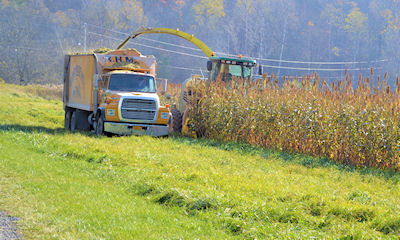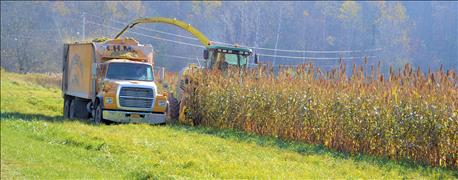May 8, 2015

When planting brown mid-ribbed sorghum, your ground must be warm, and getting warmer, says Advanced Ag Systems' Crop Consultant Tom Kilcer, Kinderhook, N.Y. Shoot for when soil temperatures at the 4-inch depth reach about 60 degrees Fahrenheit.
Related: Gain triple-play pay for organic double-crop non-GMO options
* Use narrower rows: Trials involving BMR sorghum-sudan suggest that when rows are planted 7.5 inches apart, BMR sorghum-sudan covered the ground within two to three weeks. That significantly reduces weed pressure.

CHOP OR GRAZE: BMR sorghum gives you both options for mid-summer or fall harvest. Photo by Fay Benson
* Make a longer cut: One important thing to remember about BMR sorghum crops during harvest is their high sugar content. Cropping too short risks rotting the whole crop in the silo. BMR sorghum crops can exude too much leachate and lose much of their sugar. A longer cut – about 1 to 1.5 inches – holds onto more sugar and moisture.
* Same-day ensiling: When harvested, BMR sorghum varieties need to be wrapped, bunked or ensiled the same day. Kilcer stresses that homolactic bacteria must be used – not buchneri.
And what for triticale?
* Plant early: Plant triticale at 1¼ inches deep and harvest it at flag leaf stage. As mentioned in Gain triple-play pay, the earlier triticale can be planted, the better job it does at establishing itself and capturing nutrients.
* Depth is important: To overwinter successfully, triticale needs to planted 1¼-inches deep. It can be harvested at the flag leaf stage, around May 18 to 20 in the northern United States – just in time to spread manure and plant sorghum on June 1.
* Drill them: With both crops, a good working, modern drill makes all the difference, noted Kilcer.
View Kilcer's double-crop talk on the Organic Dairy Initiative website at blogs.cornell.edu/organicdairyinitiative. For more information, contact Fay Benson, Organic Dairy Initiative Project Manager and NYCO meeting facilitator at 607-753-5213. Or email him at [email protected].
Fagan is an Organic Dairy Program Assistant with Cornell Cooperative Extension in Cortland County, N.Y.
You May Also Like




